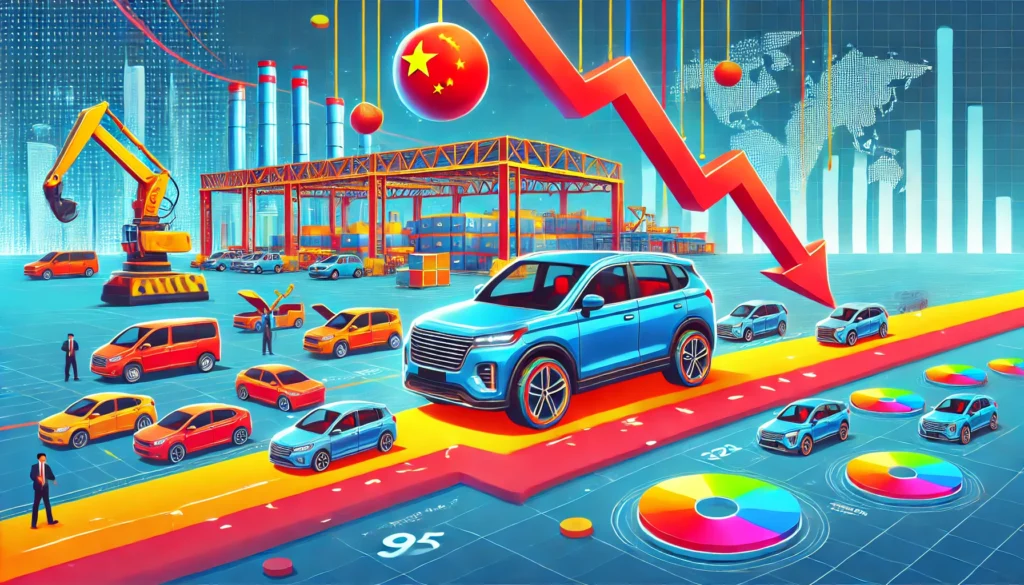China’s Car Sales Continue to Decline for the Fourth Consecutive Month
China’s automotive market, the largest in the world, is experiencing a prolonged decline in car sales, marking the fourth consecutive month of decreasing figures. This trend is raising concerns among industry leaders and market analysts.
In July 2024, car sales in China dropped by 2.8%, continuing a downward trend that has been attributed to several key factors. These include the country’s slowing economic growth, ongoing trade tensions with the United States, and increased competition from domestic electric vehicle (EV) manufacturers. The China Association of Automobile Manufacturers (CAAM) reported that this slump is part of a broader pattern of declining sales, which has persisted since late 2019.
| Key Aspect | Details |
|---|---|
| Consecutive Decline | China’s car sales have declined for four consecutive months as of July 2024. |
| July 2024 Sales Drop | Car sales dropped by 2.8% in July 2024. |
| Contributing Factors | Economic slowdown, trade tensions with the United States, and rising local competition. |
| Domestic Competitors | BYD and Nio are gaining market share with their electric vehicles. |
| International Impact | International automakers like Ford and General Motors are facing significant challenges due to the decline. |
| Government Response | The Chinese government has introduced measures such as subsidies for rural vehicle purchases and incentives for new energy vehicles. |
Factors Contributing to the Decline
- Economic Slowdown: The Chinese economy has been growing at a slower rate, affecting consumer confidence and spending power. This economic deceleration has had a direct impact on the automotive sector, which is highly sensitive to changes in economic conditions.
- Trade Tensions: The trade disputes between China and the United States have introduced uncertainties and disruptions in the market. Tariffs and other trade barriers have affected the cost and availability of vehicles and parts, contributing to the decline in sales.
- Rising Local Competition: Domestic automakers, particularly those producing EVs, have intensified their competition. Companies like BYD and Nio are gaining significant market share with their innovative and cost-effective electric vehicles. This local competition has pressured traditional automakers, including foreign brands operating in China.

Impact on International Automakers
International companies, such as Ford and General Motors, have also felt the brunt of this decline. Ford, for instance, has had to cut thousands of jobs in its joint venture with Changan Automobile due to plummeting sales. The lack of new and redesigned models, especially in the SUV segment, has further exacerbated Ford’s challenges in regaining market momentum.
Government Response
In response to the declining sales, the Chinese government has introduced various measures aimed at stimulating the automotive market. These include subsidies for rural vehicle purchases and incentives for buying new energy vehicles (NEVs). However, despite these efforts, the market has yet to show significant signs of recovery.
| Participant | Contact Details |
|---|---|
| China Association of Automobile Manufacturers (CAAM) |
Address: No. 46 Dongsi Xidajie, Beijing 100711, China Phone: +86 10-6553-3181 Email: caam@caam.org.cn Website: www.caam.org.cn |
| BYD |
Address: No. 3009, BYD Road, Pingshan, Shenzhen 518118, China Phone: +86 755-8988-8888 Email: byd@byd.com Website: www.byd.com |
| Nio |
Address: Building 20, No. 56 AnTuo Road, Jiading District, Shanghai 201804, China Phone: +86 21-6908-2018 Email: ir@nio.com Website: www.nio.com |
| Ford China |
Address: No. 18 Chang’an Avenue, Beijing 100738, China Phone: +86 10-6522-8888 Email: fordchina@ford.com Website: www.ford.com.cn |
| General Motors China |
Address: GM Tower, 1088, Hengfeng Road, Shanghai 200070, China Phone: +86 21-2898-8888 Email: gmchina@gm.com Website: www.gmchina.com |
The ongoing decline in China’s car sales highlights the complexities and challenges faced by the automotive industry in the current economic and political climate. While the market continues to struggle, the response from both the government and the industry will be crucial in determining the future trajectory of car sales in China.
For more detailed information, you can refer to sources from Reuters and other industry reports.

